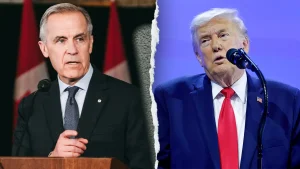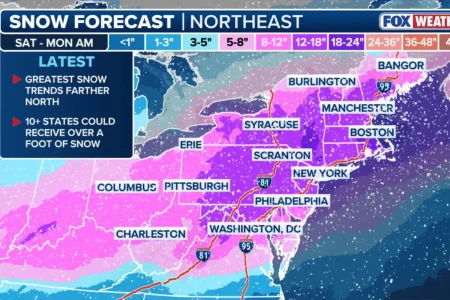North American Partners Forge Path Forward Amid U.S. Policy Uncertainties
Canadian and Mexican Leaders Seek Strategic Alignment in Changing Continental Landscape
In a significant diplomatic engagement that signals a shifting dynamic across North America, the leaders of Canada and Mexico recently convened for substantive talks focused on strengthening their bilateral relationship while navigating the complexities posed by their shared neighbor, the United States. Prime Minister Justin Trudeau and President Andrés Manuel López Obrador met in what analysts describe as an increasingly necessary alliance-building exercise between the two nations, which both face similar challenges in dealing with U.S. policy volatility. The meeting, held amid growing economic and political uncertainties across the continent, represents a strategic pivot as both countries seek to diversify their diplomatic and trade relationships beyond their traditional dependence on the United States.
The talks in Mexico City covered an extensive agenda, including trade expansion, immigration coordination, climate change initiatives, and security cooperation. Behind closed doors, however, sources familiar with the discussions revealed that a significant portion of the dialogue centered on developing contingency strategies to address unpredictable policy shifts from Washington. “Both leaders recognize that while the United States remains an indispensable partner, they must prepare for scenarios where American policies may suddenly change direction,” said Carlos Dominguez, an international relations expert at the University of Mexico. This pragmatic approach reflects the lessons learned from recent years, during which both nations have experienced firsthand the economic and diplomatic turbulence that can arise from sudden U.S. policy reversals. The meeting underscores a growing recognition that in today’s geopolitical landscape, even the closest allies must maintain flexible strategies and diverse partnerships.
Economic Resilience Through Diversified Trade Relations
The economic dimension of the Canada-Mexico relationship has taken on renewed importance as both countries seek to build resilience against potential trade disruptions. With bilateral trade between Canada and Mexico reaching approximately $41 billion annually—a figure that has grown steadily but remains far below each country’s trade volume with the U.S.—both leaders expressed commitment to significantly expanding commercial ties. “We see tremendous untapped potential in our direct relationship,” Prime Minister Trudeau stated during the joint press conference. “By strengthening our bilateral economic cooperation, we can create more stable and sustainable growth for both our nations.” President López Obrador echoed this sentiment, emphasizing that “while the North American economic integration remains foundational, we must also develop stronger direct linkages between our economies.”
The discussions yielded several concrete initiatives, including plans to streamline customs procedures, increase investment in transportation infrastructure connecting the two countries, and establish a bilateral commission focused on identifying new sectors for economic cooperation. Particularly promising areas include renewable energy technology, agricultural trade, and digital services. Economic analysts note that this diversification strategy serves dual purposes: it creates new opportunities for growth while also providing a buffer against potential disruptions in U.S. trade policy. “What we’re seeing is the natural evolution of the North American economic space,” explained Dr. Margaret Wilson, an economist specializing in North American trade at the University of Toronto. “As the continent’s economic integration has deepened over decades, it makes sense that Canada and Mexico would eventually develop a more robust direct relationship rather than continuing to interact primarily through their U.S. connections.” Business leaders from both countries have welcomed these initiatives, with many expressing that diversification has become not just a strategic preference but an economic necessity in an era of increased uncertainty.
Immigration and Border Management: A Shared Challenge
Immigration emerged as a central topic during the bilateral discussions, with both countries facing similar pressures as transit and destination nations for migrants. The conversation marked a notable shift from the traditional framework where immigration has been primarily discussed as a U.S.-Mexico or U.S.-Canada issue. Instead, the leaders approached it as a continental challenge requiring coordinated responses across North America. “We recognize that effective immigration management requires collaboration across all three countries,” Trudeau noted. “Canada and Mexico face many similar challenges as both transit and destination countries, and we can learn from each other’s experiences.”
The discussions produced a framework for information sharing on migration patterns, coordinated humanitarian responses, and joint initiatives to address the root causes of migration in Central and South America. Both leaders acknowledged the complex humanitarian dimensions of immigration while emphasizing the need for orderly and legal migration processes. The talks also touched on the potential for expanding temporary worker programs between Canada and Mexico, which could provide alternative legal pathways for migration. “This approach represents a more comprehensive view of migration in North America,” commented Dr. Elena Jimenez, director of the Center for Migration Studies in Mexico City. “Rather than viewing migration solely through the lens of border security, the leaders are acknowledging migration as a complex phenomenon requiring multifaceted solutions.” The discussions highlighted how both countries have increasingly found themselves responding to unpredictable U.S. immigration policies, which have at times created sudden pressures on their own immigration systems. By strengthening their bilateral cooperation, Canada and Mexico aim to develop more consistent approaches that can withstand policy fluctuations from their larger neighbor.
Climate Change and Energy: Aligning North American Environmental Policies
Environmental cooperation emerged as another key area where Canada and Mexico see opportunities for alignment in the face of fluctuating U.S. climate policies. Both nations have experienced the challenges of coordinating environmental initiatives with the United States through different administrations that have taken dramatically different approaches to climate policy. “Climate change doesn’t respect borders, and our response needs to be consistent and sustained across administrations,” Trudeau emphasized during the joint press conference. The leaders announced a new bilateral climate action framework that includes increased cooperation on renewable energy development, carbon pricing mechanisms, and environmental technology transfer.
The framework also established a permanent working group to coordinate their positions in international climate negotiations, potentially creating a united front that could influence U.S. climate policy through collective pressure. Energy experts see this cooperation as particularly significant given both countries’ positions as major energy producers with economies still substantially tied to fossil fuel production. “What’s notable here is that both Canada and Mexico are trying to navigate similar energy transitions,” observed Dr. James Williams, director of the North American Energy Institute. “Both have significant fossil fuel sectors they can’t immediately abandon, yet both have made international commitments to reduce emissions. By sharing best practices and technologies, they can potentially find more effective transition paths.” The leaders also discussed strategies for ensuring that environmental standards remain consistent across North America, preventing a scenario where companies might relocate to jurisdictions with weaker regulations. This approach reflects a broader recognition that environmental policy coordination has become increasingly important to maintaining economic competitiveness in a world moving toward greener standards.
Building Resilience Against Political Volatility
Perhaps the most delicate aspect of the discussions—though carefully framed in diplomatic language during public statements—was how both nations can maintain stable policies and relationships despite potential political volatility in the United States. Without directly mentioning specific U.S. political dynamics, both leaders emphasized the importance of “policy continuity,” “institutional strength,” and “diplomatic predictability” in their public remarks—terms that analysts interpret as diplomatic code for concerns about potential U.S. policy reversals following election cycles. “What we’re witnessing is the natural response of nations that have experienced the whiplash effect of U.S. policy changes,” explained Dr. Robert Chen, international relations professor at Georgetown University. “It’s not about distancing themselves from the U.S., but rather about building shock absorbers into the relationship.”
The strategy includes strengthening direct institutional links between Canadian and Mexican government agencies, increasing the frequency of bilateral consultations, and establishing mechanisms to maintain consistent approaches to shared challenges regardless of political changes in any North American capital. Business leaders from both countries have particularly welcomed this approach, as policy predictability remains crucial for long-term investment decisions. “The business community needs certainty,” said Maria Gonzalez, president of the Canada-Mexico Business Council. “When companies can’t predict the regulatory or trade environment from one year to the next, it creates hesitation that ultimately harms economic growth across the continent.” The meeting concluded with both leaders reaffirming their commitment to the broader North American partnership while simultaneously acknowledging that the relationship between Canada and Mexico has evolved into a more substantial and direct connection than in previous decades. As Trudeau stated in his closing remarks, “While the North American relationship has traditionally been visualized as two strong bilateral relationships with the United States, we are now seeing the emergence of a truly trilateral framework where each relationship stands on its own merit.”
The diplomatic engagement between Canada and Mexico represents a maturing of North American relations and reflects the natural evolution of two nations that have grown more confident in their international postures. As the continent faces an era of potential uncertainty, the strengthened Canada-Mexico partnership provides a stabilizing influence that may ultimately benefit all three North American nations by maintaining the consistency and predictability essential for shared prosperity.










